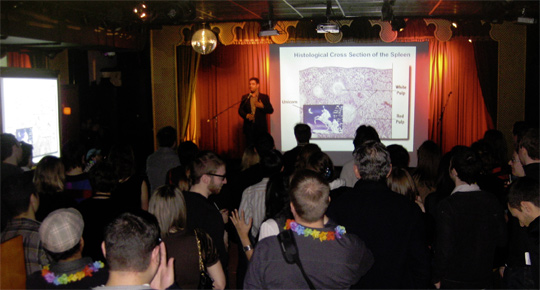It’s back! Once again, to close out Social Media Week Toronto, we are going to be hosting a rocking session of PowerPoint Karaoke. The rules of Powerpoint Karaoke are simple. A set of presenters and local social media luminaries will be asked to play the role of an earnest expert speaker on classic topics like “How to succeed at social media without really trying“, or “Should you keep bees in your pants: An honest debate“, or “My sensational life as a Japanese tentacle porn star“. As always, many, many new decks are in the throws of preparation for premiering at #PPKTO like “How is babby formed? an amazing factual expose” or “All reported side effects were minor and … temporary”.
New for PPTKTO3:
-
CanadaHelps.org! all proceeds are going to support an awesome local charity CanadaHelps.ca. Canadahelps provides tools and training to help thousands of Charities raise funding and donations online and through social media.
Duets! New for this round we’re going to introduce a “duets” as well as singles format, and we’ll have some excellent prizes for the best in each category.
If you yourself would like to present at PPTKTO3, you can apply at the link below and by tweeting with why we should pick you (and/or your partner) the hash tag #PPTKTO.
Want to join us at PPTKTO? Of course you do! get your tickets here:
LINK: Official Ticket Site for PowerPoint Karaoke 3
Sponsors for PowerPoint Karaoke 3 Toronto:
(ok, this is a pretty crazy-amazing list)

BTW you going to REALLY want to buy an armlength or two of our charity raffle tickets…
Photo credit: Matthew Burpee



